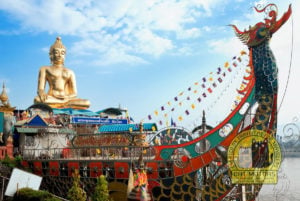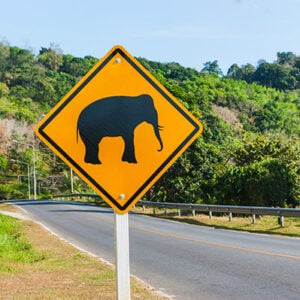Car Rentals in Chiang Mai: Discover the Best Deals (Update 2024)
Embark on an exhilarating journey with this essential guide to car rentals in Chiang Mai, your passport to the countless wonders of Northern Thailand. Envision yourself cruising through the bustling cityscapes and serene rural areas, each turn offering a new discovery.
This historic city, dotted with ancient temples and vibrant markets, offers a variety of reliable car rental services. Simply bring your driving license and passport, and you’re ready to explore the myriad attractions at your leisure. You’ll love the freedom and adventures that await.
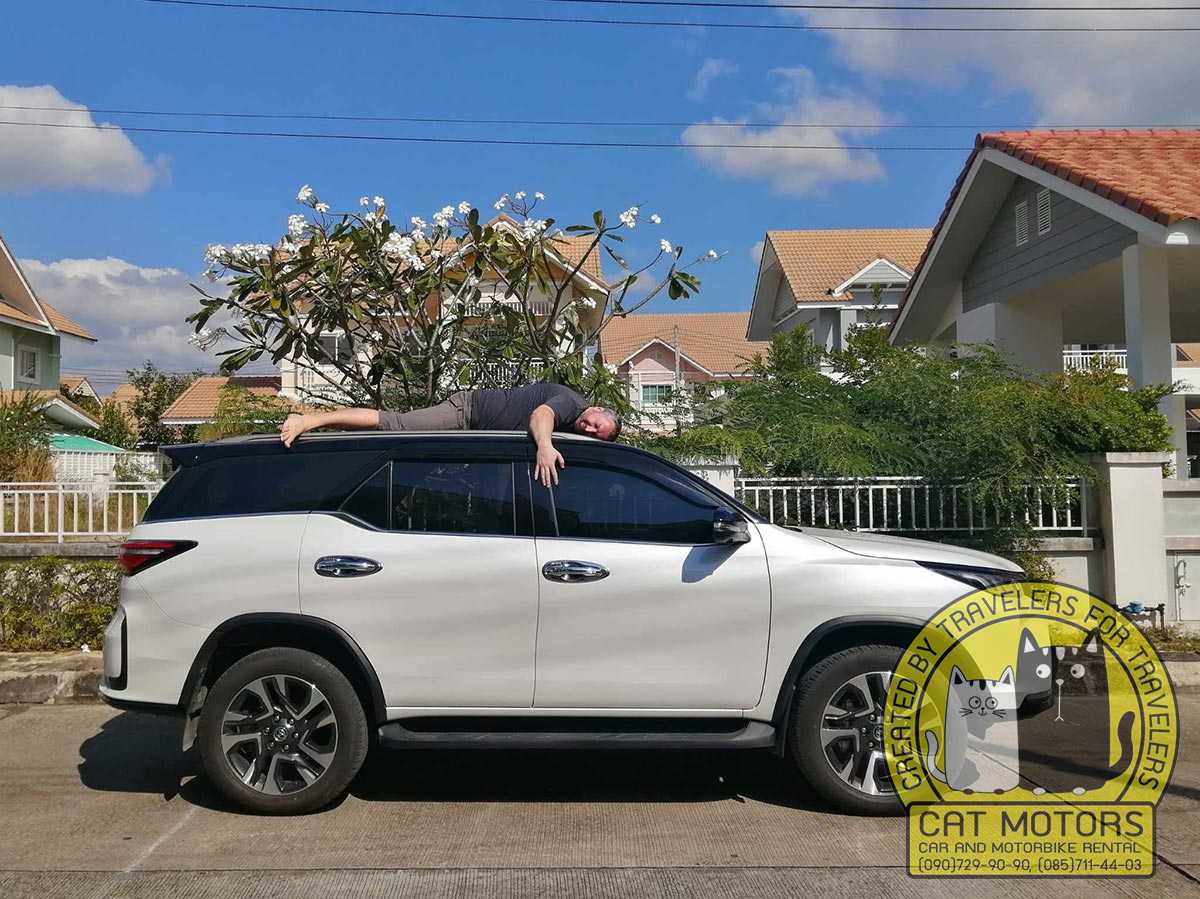
Quick Note: This easy-to-understand guide to renting a car in Chiang Mai has about 5,000 words, which will take around 15 minutes to read. If you’re rushed for time, here’s the quick scoop:
Chiang Mai has tons of places where you can rent a car. For the best deals, head over to the websites EconomyBookings and RentalCars. These sites gather and compare the best offers from trustworthy car rental providers all over the city. But here’s a pro tip: make sure to check both sites! You wouldn’t believe it, but sometimes the cost for the same car from the same company can be one and a half to two times higher on one site than the other.
What’s more, booking a car through these websites can often be way cheaper than getting it straight from the car rental companies. So, a little time spent comparing prices online could save you a bundle of cash!
If you’re the kind of person who likes to know all the details, plan to spend about 10-15 minutes to read through this guide from start to finish. We’ve covered everything you need to know in the following sections. So, let’s get rolling!
Why Rent a Car in Chiang Mai?
Exploring Chiang Mai and Surrounding Areas at Your Own Pace
Renting a car affords you the opportunity to explore the city and its neighboring areas at your own pace and discretion. Unlike scheduled tours or public transportation, a rental car allows you to spend as much time as you desire at a particular site, be it the majestic Doi Suthep Temple, the bustling Warorot Market, or the serene Old City. You can also discover lesser-known attractions that are typically off the beaten path, offering a unique and personal exploration of the region.
The areas surrounding Chiang Mai are equally captivating and are easily accessible by car. A rental vehicle provides the flexibility to embark on a scenic drive to the picturesque mountain town of Pai, visit the quaint villages in the Golden Triangle region, or explore the stunning national parks in the province.
Freedom to Alter Your Itinerary
One of the significant advantages of renting a car is the freedom it offers to modify your itinerary as you wish. There’s no need to stick to a fixed schedule or route, and you can adjust your plans based on weather conditions, personal interests, or recommendations from locals. This freedom lends itself to a more relaxed and personalized vacation, enabling you to create memorable experiences based on your preferences.
Convenience Over Public Transport
While Chiang Mai’s public transport network is extensive, it might not offer the same level of convenience and comfort as a rental car. Buses and songthaews (shared taxis) operate on fixed routes and schedules, and navigating these systems can sometimes be a challenge, especially for first-time visitors.
In contrast, a rental car provides the comfort of traveling with your belongings securely stored, the convenience of setting your departure times, and the assurance of reaching your destination without having to negotiate fares or routes. If you’re traveling in a group or with family, a rental car can often be a more cost-effective and practical option.
Moving around the city by car is really much more convenient than walking. Moreover, the car has air conditioning that will save you from the heat. Therefore, do not forget to check the best car rental rates on the website of Economy Bookings and Rental Cars. We recommend it.
Types of Vehicles Available for Rent
Standard Cars
Standard cars are a great option for travelers who prioritize fuel efficiency, cost-effectiveness, and ease of maneuverability, particularly in urban settings. These popular cars are usually compact or mid-sized sedans and hatchbacks, making them ideal for navigating the city streets of Chiang Mai or taking quick trips to nearby locations.
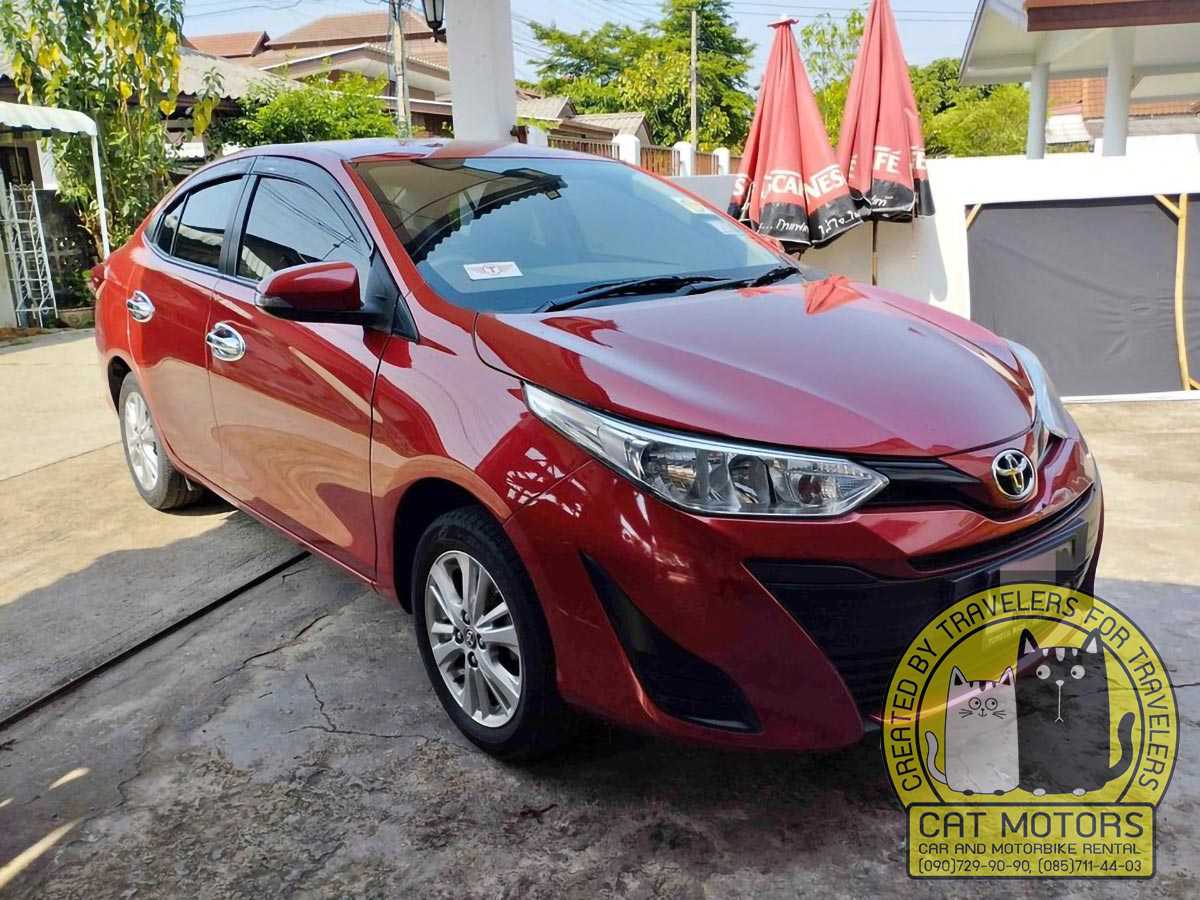
Despite their smaller size, they offer ample comfort and come equipped with essential amenities like air conditioning, radio, and often GPS navigation systems. Furthermore, their compact design makes parking in crowded areas a lot easier, an advantage if you plan to explore bustling markets or densely populated zones.
SUVs
Sport Utility Vehicles (SUVs) are an excellent choice for travelers looking for versatility, particularly those planning to venture into Chiang Mai’s surrounding countryside, which includes mountainous terrain and unpaved roads.
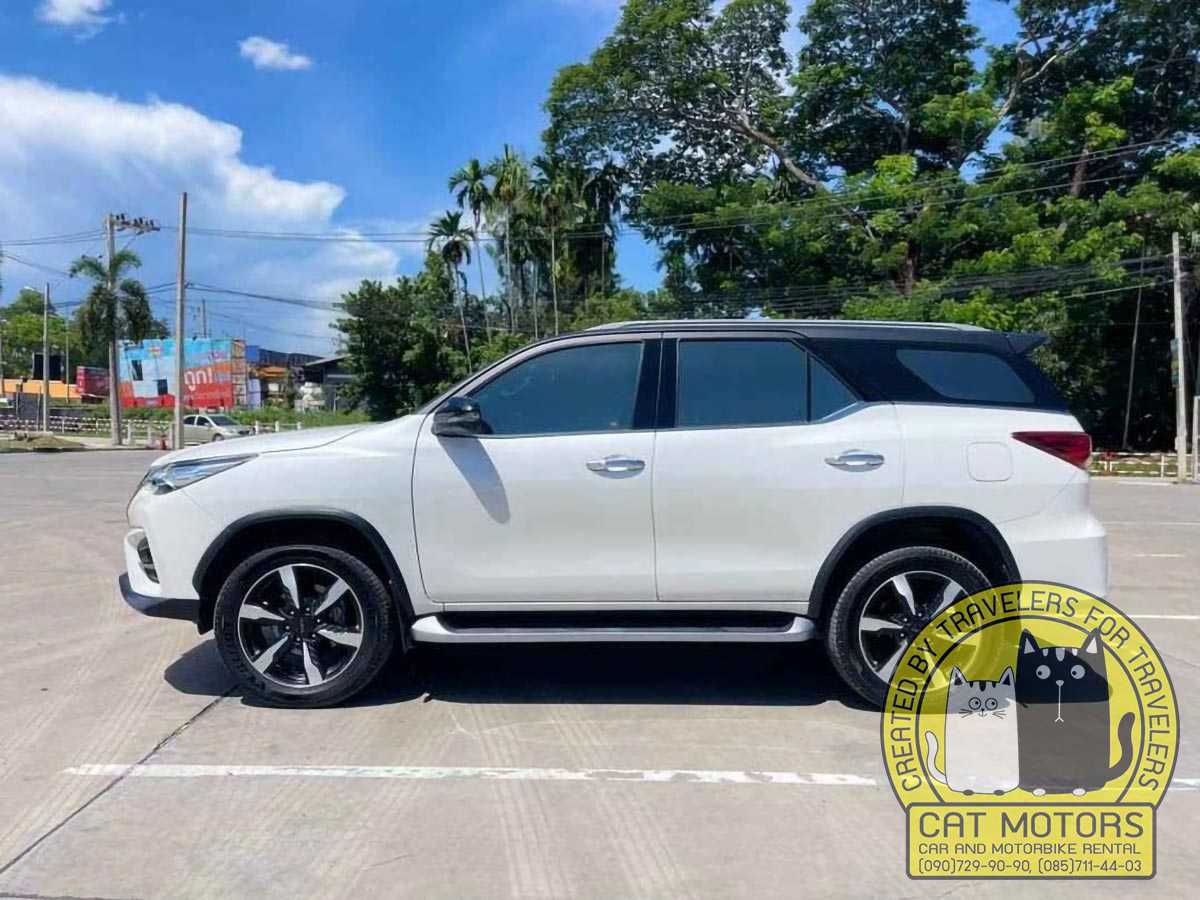
With a higher ground clearance and often featuring all-wheel drive, SUVs can handle such rough terrain more smoothly and safely compared to standard cars. In addition, SUVs typically offer more spacious interiors, providing enhanced comfort and extra luggage space, an important factor if you’re planning for long drives or multi-day trips to places like Doi Inthanon National Park or the Golden Triangle. Many SUVs also offer advanced features such as cruise control and Bluetooth connectivity, which add to the comfort and convenience during longer journeys.
Vans
If you’re traveling in a large group or with family, vans offer the most practical solution. Equipped with multiple seats, they provide ample space to accommodate large parties without compromising on comfort. Vans also have generous luggage capacity, ensuring that everyone’s belongings can be stored conveniently.
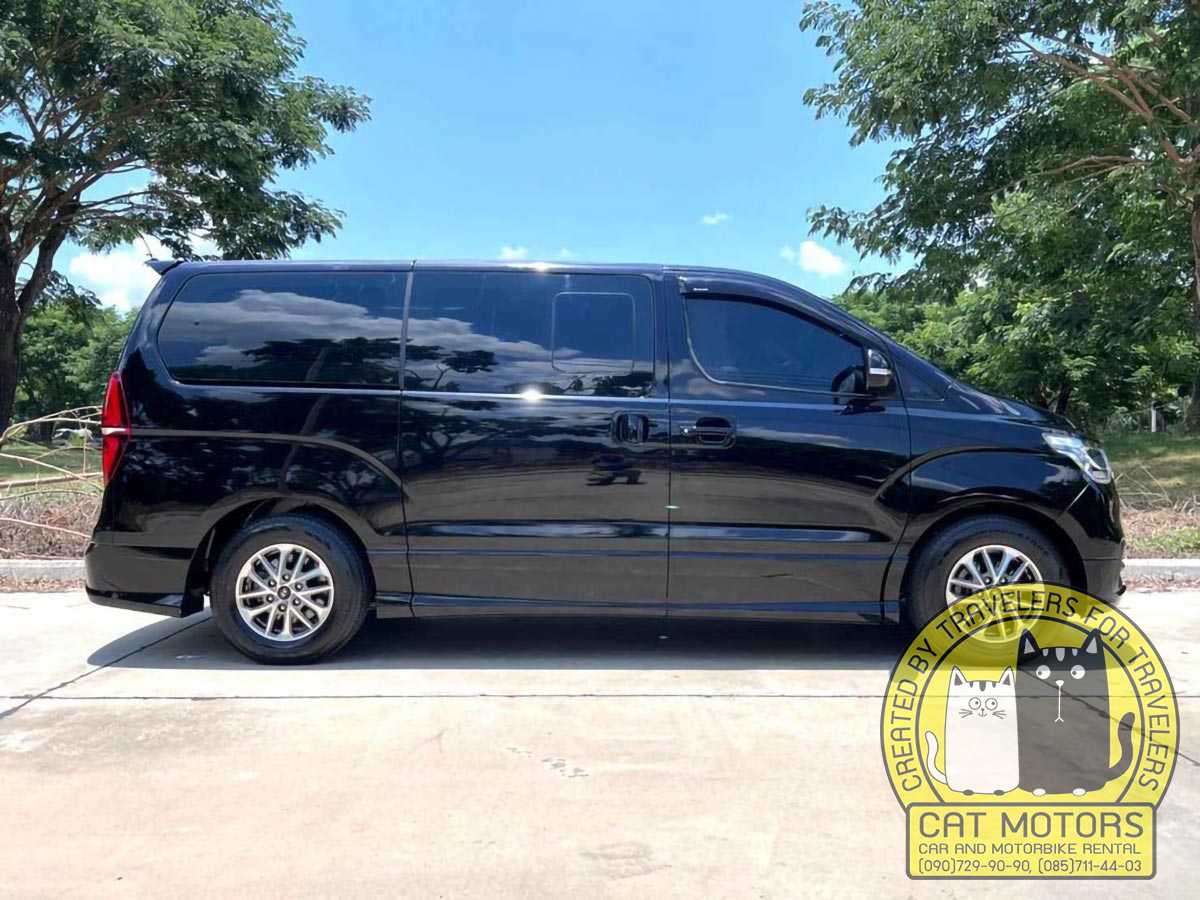
The expansive windows in vans offer everyone a clear view of the passing scenery, making the journey more enjoyable. If you’re planning to visit attractions that are a bit farther from the city, like the White Temple (Wat Rong Khun) in Chiang Rai, renting a van could prove to be a comfortable and cost-effective solution, allowing everyone in the group to travel together rather than splitting into separate vehicles.
Whether you need a small compact car or a minivan. On the websites of Economy Bookings and Rental Cars, in one place, you will find a huge selection of car types from budget to luxury. No other private rental company can offer you such a wide range of rental cars at the best prices in the city.
Choosing the Right Car for Your Needs
When it comes to selecting the appropriate rental car for your Chiang Mai adventure, various factors come into play. These can influence your driving experience, the comfort of your trip, and even the economy of your travel budget. Here are some considerations to guide you in choosing the right vehicle:
Number of Passengers
One of the first things to consider is the size of your travel party. If you’re traveling solo or with one companion, a small cheap car will typically suffice. On the other hand, if you’re part of a larger group or family, a van that can comfortably seat a larger number of people may be more appropriate. Remember, comfort is key, especially during longer drives, so ensure everyone has ample space for the journey.
Type of Travel
The nature of your journey will greatly influence the type of car you should rent. For city driving and short trips, compact cars are perfect due to their compact size and fuel efficiency. However, if you plan to explore the countryside or navigate mountainous terrains around Chiang Mai, you might want to opt for an SUV with higher ground clearance and all-wheel drive for a smoother and safer ride.
Luggage Space
The amount of luggage you plan to bring also plays a role in the type of car you should rent. If you’re traveling light, luggage space might not be a significant concern. However, if you’re on a longer trip with considerable baggage or planning outdoor activities that require equipment (like camping in the national parks), you’ll need a vehicle with ample trunk space. Again, SUVs and vans excel in this department.
Car Models and Travel Scenarios
Choosing the right model of car can also enhance your travel experience. For example, a compact sedan like a Toyota Corolla or Honda Civic can be perfect for zipping through city streets and easy parking, while a mid-size SUV like the Subaru Outback or Toyota Fortuner can provide the comfort and versatility needed for scenic drives to Doi Inthanon National Park or the Golden Triangle. Larger groups might find models like the Toyota Commuter van ideal for comfortable and communal travel.
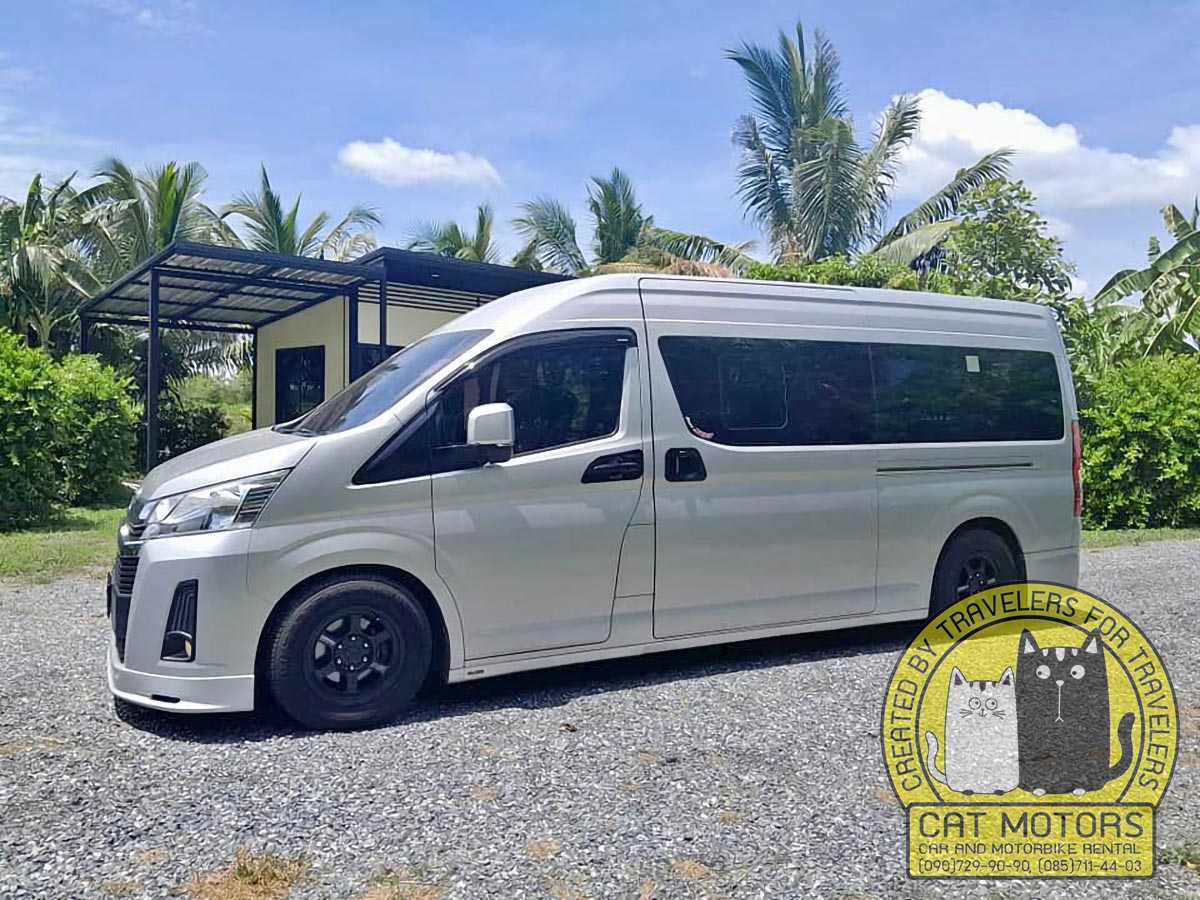
In summary, choosing the right car for your needs is a crucial step in planning your Chiang Mai trip. By taking these factors into account, you’ll ensure that you select a vehicle that not only meets your needs but also enhances your travel experience.
It doesn’t matter where you want to go on your trip: drive around the city for a couple of days or go on a multi-day trip through the off-roads of northern Thailand. On the websites of Economy Bookings and Rental Cars you will always find the car you need. But do not forget that in the high season all rentals are overbooked. Therefore, book cars in advance.
Popular Car Rental Companies in Chiang Mai
Chiang Mai offers a wealth of reputable and popular car rental companies, each providing a unique blend of service, car variety, and pricing options. Here are a few reliable options for your consideration:
Sixt: This internationally renowned rental provider offers a diverse fleet of vehicles that caters to all types of travel needs. Sixt’s range extends from economy cars, ideal for navigating city streets, to rugged SUVs designed to tackle the adventurous mountain routes. Known for their affordable rates and efficient service, they also provide useful extras like GPS and child seats.
Budget Car Rental: Budget lives up to its name by offering excellent service at competitive prices. Whether you’re seeking a compact city car or a larger vehicle for more extensive travel, Budget’s range has something for everyone. They also provide flexible rental durations, accommodating both short and extended stays.
Avis: Known for its top-notch customer service and a wide range of vehicles, Avis is a reliable choice for any traveler. They offer everything from compact cars to larger SUVs, meeting varied travel needs. Special deals and discounts are frequently available, enhancing its attractiveness to potential customers.
Hertz: As one of the oldest and most recognized car rental enterprises globally, Hertz maintains high standards of service. They offer a wide variety of vehicles from small economy cars to larger sedans and SUVs. Hertz’s reputation for reliability, plus the option for Gold Plus Rewards for frequent renters, makes it an appealing choice.
Chic Car Rent: A local favorite, Chic Car Rent provides an authentic and reliable service. They offer a good selection of well-maintained and clean vehicles, from compact cars to spacious vans. Chic Car Rent’s strength lies in their deep understanding of local needs and their friendly, efficient service.
Thai Rent A Car: As a leading car rental agency in Thailand, Thai Rent A Car is known for its extensive fleet of modern vehicles and outstanding customer service. They provide a range of cars from economical models to larger, more comfortable vehicles. With competitive pricing and a seamless rental process, they have become a go-to choice for many travelers.
Europcar: Globally recognized, Europcar offers a high standard of service with a broad selection of vehicles. Whether you’re looking for a fuel-efficient compact for city exploration or a sturdy SUV for longer drives, Europcar has you covered. Their transparent pricing and convenient rental process make them a trusted choice among tourists.
Remember, each company has its own terms and conditions, so it’s important to read the rental agreement carefully before making a decision.
In addition to the large car rental companies mentioned above, there are dozens of private rental companies in Chiang Mai, and hundreds more individuals rent out their personal cars. Despite such a wide variety of offers, Economy Bookings and Rental Cars, in our opinion, offer the best rental conditions and the best prices, due to market competition, when in one place you can compare many offers from rental agencies and choose the best of them.
How to Hire a Car in Chiang Mai
Renting a car in Chiang Mai is a straightforward process, but it requires a step-by-step approach and knowledge about the necessary documents and eligibility. Here is a detailed guide:
Step-by-Step Process of Car Rental
Research: Begin by conducting thorough online research to identify suitable car rental agencies. This includes comparing average prices, vehicle availability, rental packages, and any additional costs.
Identify Your Needs: Consider the type and size of the car you need, as well as the specific dates and duration of the rental. Don’t forget to think about pick-up and return locations, which will depend on your itinerary and travel plans.
Choose a Rental Agency: Once you have identified your needs and compared agencies, choose a suitable car rental service. Sixt, Budget Car Rental, and Avis are reliable options with offices in Chiang Mai.
Book Your Car: Proceed to book the car you need, either through the rental agency’s website or by contacting them directly. Be prepared to provide your personal information and travel details.
Necessary Documents and Eligibility
Car rental in Chiang Mai typically requires the following:
Age Requirement: You must be at least 21 years old to rent a car in most agencies. However, the age limit can vary, and some car rental companies might charge an additional fee for drivers under the age of 25.
Driving License: A valid driving license is essential. If you are a foreigner, an international driving permit, along with your original driving license from your home country, is required.
Credit Card: A credit card in your name is necessary for the security deposit.
Passport: For international rentals or if you’re a foreigner, you’ll need a valid passport.
Remember to read the rental agreement carefully. It outlines the terms and conditions, policies, and any potential fines for damage or late return.
Pre-Rental Inspection Tips
Before taking the car off the rental lot:
Exterior Check: Inspect the car’s exterior for any pre-existing damage, including scratches, dents, broken lights, or a damaged windshield.
Interior Check: Look at the car’s interior for tears or stains in the upholstery, and make sure all equipment, such as air conditioning, the radio, and windows, is working properly.
Document Damage: Document any visible damage with photos and report it to the rental agency before you leave the premises.
Test Drive: If possible, request a test drive to ensure the car is running smoothly. Check the brakes, steering, and signals.
Renting a car requires some preparation and due diligence, but by understanding the step-by-step process, knowing the necessary documents and eligibility requirements, and adhering to pre-rental inspection tips, you can ensure a smooth and convenient car rental experience in Chiang Mai.
Unlike many small private rental companies, Economy Bookings and Rental Cars will always offer you free first class insurance that covers any damage, and will also allow you to add 1-2 more drivers to the rental agreement for free. You can also return the car in another city. This is very convenient for multi-day road trips.
Understanding the Rental Agreement
Navigating a car hire agreement can seem daunting due to the legal jargon and numerous clauses, but it is essential to understand these terms before signing to avoid any unforeseen complications. Here are some key points to help you:
Rental Period: The agreement will specify the duration of your rental. Pay attention to the pick-up and drop-off times, as returning the car late could incur an extra day’s charge.
Mileage Limitations: Some rental agreements have a mileage limit. If you go over, you could be charged an additional fee. If you plan to drive a lot, consider opting for unlimited mileage if available.
Fuel Policy: Typically, you’ll pick up the car with a full tank and are expected to return it the same way. If you don’t, the rental company may charge a premium to refill the tank.
Additional Drivers: There might be extra charges if more than one person will be driving the rental car. All additional drivers usually need to be identified on the rental agreement.
Geographic Restrictions: Some rental providers may have restrictions on where you can drive the car. Make sure you’re clear on these before you set off on your journey.
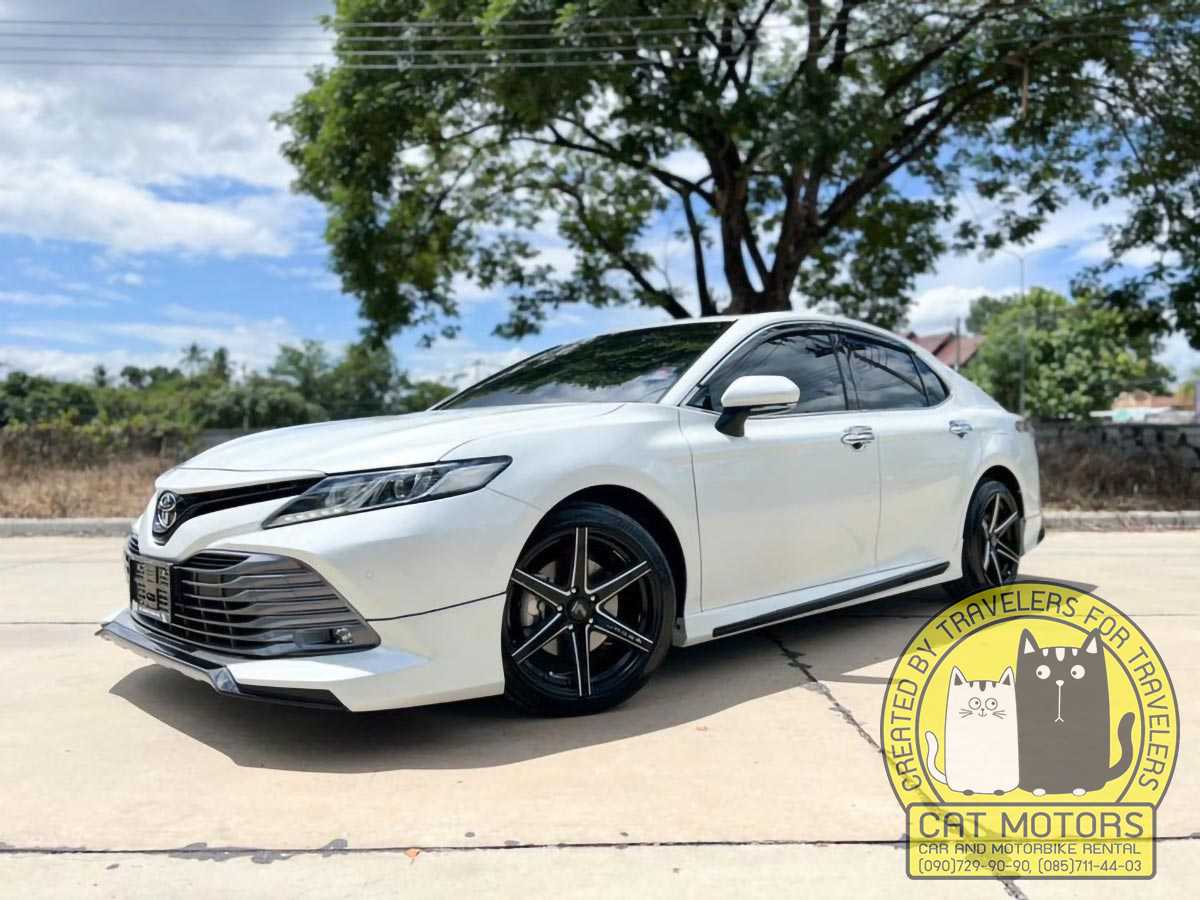
Understanding Insurance Options
Insurance coverage for rental cars can be a bit confusing. Here’s a breakdown of the common types of coverages that you may come across:
Collision Damage Waiver (CDW)/Loss Damage Waiver (LDW): This isn’t technically insurance, but it can protect you from the cost of damage to the rental car.
Liability Insurance: This covers damage you do to others’ cars or property.
Personal Accident Insurance (PAI): PAI covers medical costs for you and your passengers if you’re involved in an accident.
Personal Effects Coverage (PEC): PEC insures your personal belongings against theft from the rental car.
Remember, you might already be covered for car rental insurance through your own car insurance or your credit card. It’s worth checking this before you opt for the rental company’s insurance.
First-class commercial vehicle insurance, which fully covers any damage, in Thailand is issued only on cars that are no more than 5-7 years old, depending on the insurance company. This is very important because some private renters offering cars for rental at a very low price have vehicles that exceed this age. That means no insurance company will cover the damage if you get into an accident.
But if you rent a car for several months, then look at the local private rental companies, it may be cheaper. But keep in mind that during the peak season (December-January) small companies may not have cars in the parking lot, and prices can exceed all reasonable limits. This is because renting cars monthly during the high season is not profitable, because they make as much in just one week of the high season as they do in one month during normal times.
Yeap, this is true. Some private car owners don’t provide full insurance for the vehicles they rent to you because their vehicles are old and no insurance company wants to touch it. And this is one of the most important reasons why we recommend Economy Bookings and Rental Cars, where large car rental companies rent cars with first class insurance that covers any damage to the car and liability to third parties.
Explanation of Terms and Conditions
The terms and conditions section of the agreement will cover various aspects, including age restrictions for drivers, fines for late return or damage to the vehicle, and cancellation policies. It might also outline the procedures for accidents or breakdowns. It’s important to read this section thoroughly to avoid potential penalties and to understand your responsibilities and rights.
In conclusion, being aware of these components in your rental agreement will help ensure a smooth rental experience. Remember, don’t hesitate to ask the rental company to clarify any points you’re unsure about. This way, you’ll fully understand what you’re agreeing to, which can give you peace of mind during your rental period.
Discovered Car Rental Patterns in Chiang Mai
Generally, if you’re renting a car from the same place you’ll return it, and you’re renting it for 2-3 days or more, you’re likely to get a better deal with Economy Bookings compared to Rental Cars. It’s not really worth checking other car rental brokers like Local Rent or Discover Cars, because they don’t have as many cars available and their prices are usually higher.
Let’s look at an example: let’s say you’re booking a car from December 12 to 18, and you plan to pick up and drop off the car at Chiang Mai Airport. If you use EconomyBookings, the rental price is 5,824 baht, while at Rental Cars it’s 6,454 baht. That’s a difference of 630 baht!
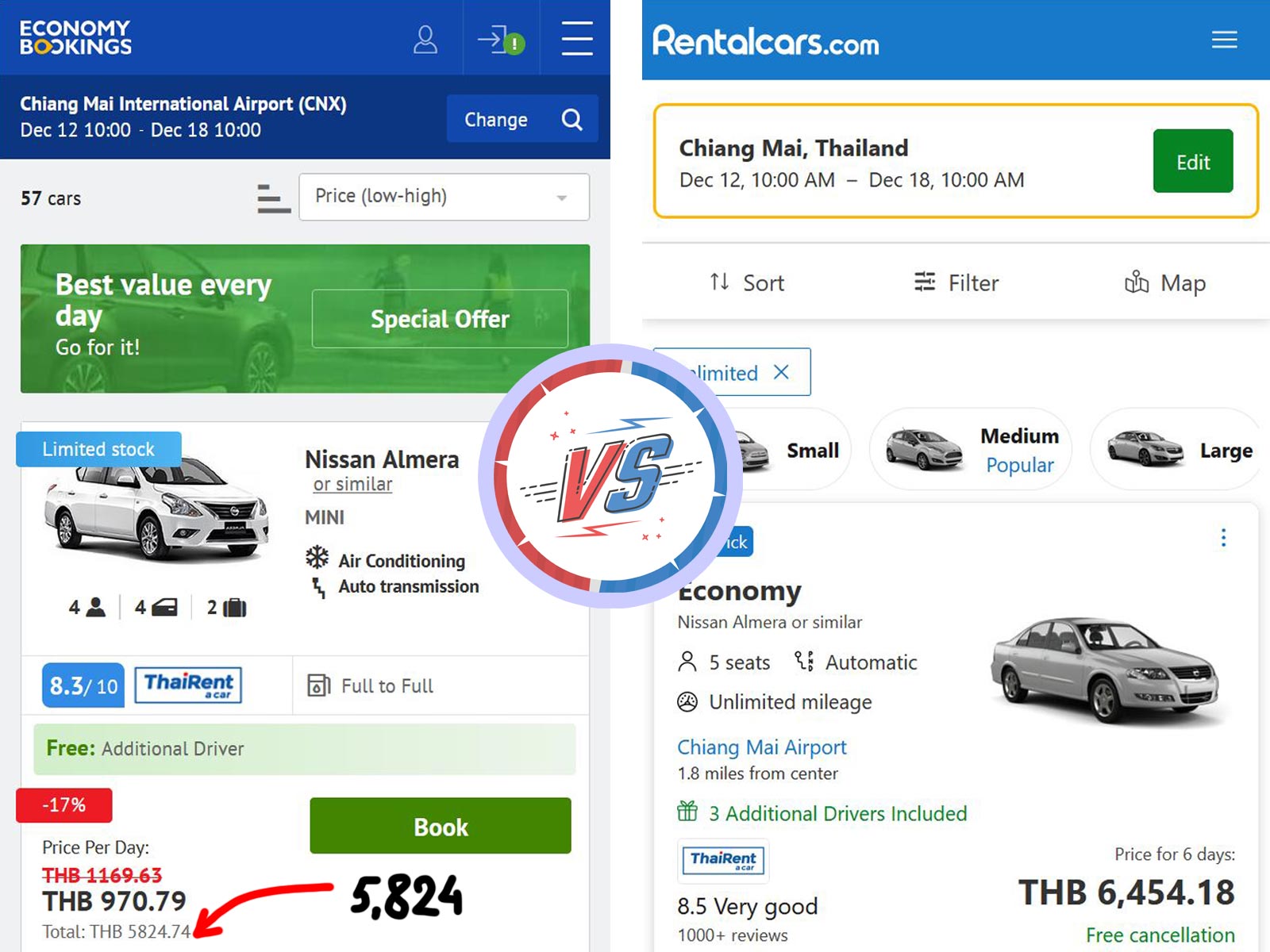
Here’s a screenshot showing the price difference on the two websites. Now, both of these deals are with the same service provider, a company called Thai Rent A Car. But if we go to Thai Rent A Car’s own website, we see that the price ranges from 6488 baht to 7340 baht, depending on how you choose to pay. That’s quite a bit more, isn’t it?
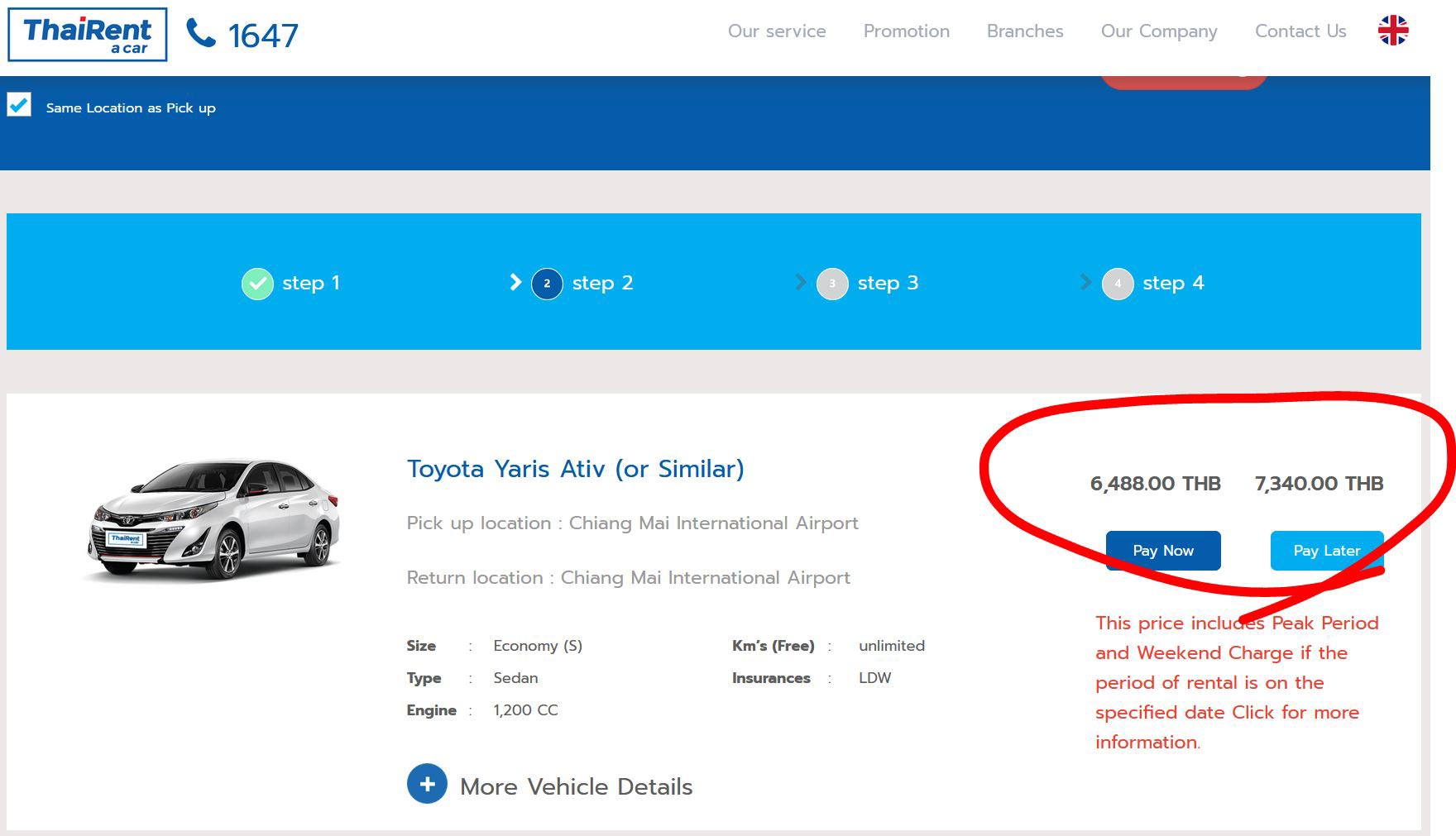
However, if you’re planning to rent a car in Chiang Mai and drop it off somewhere else, like Phuket, Rental Cars might be a better deal. In fact, you could save as much as 4,078 baht compared to EconomyBookings, which is about $109.
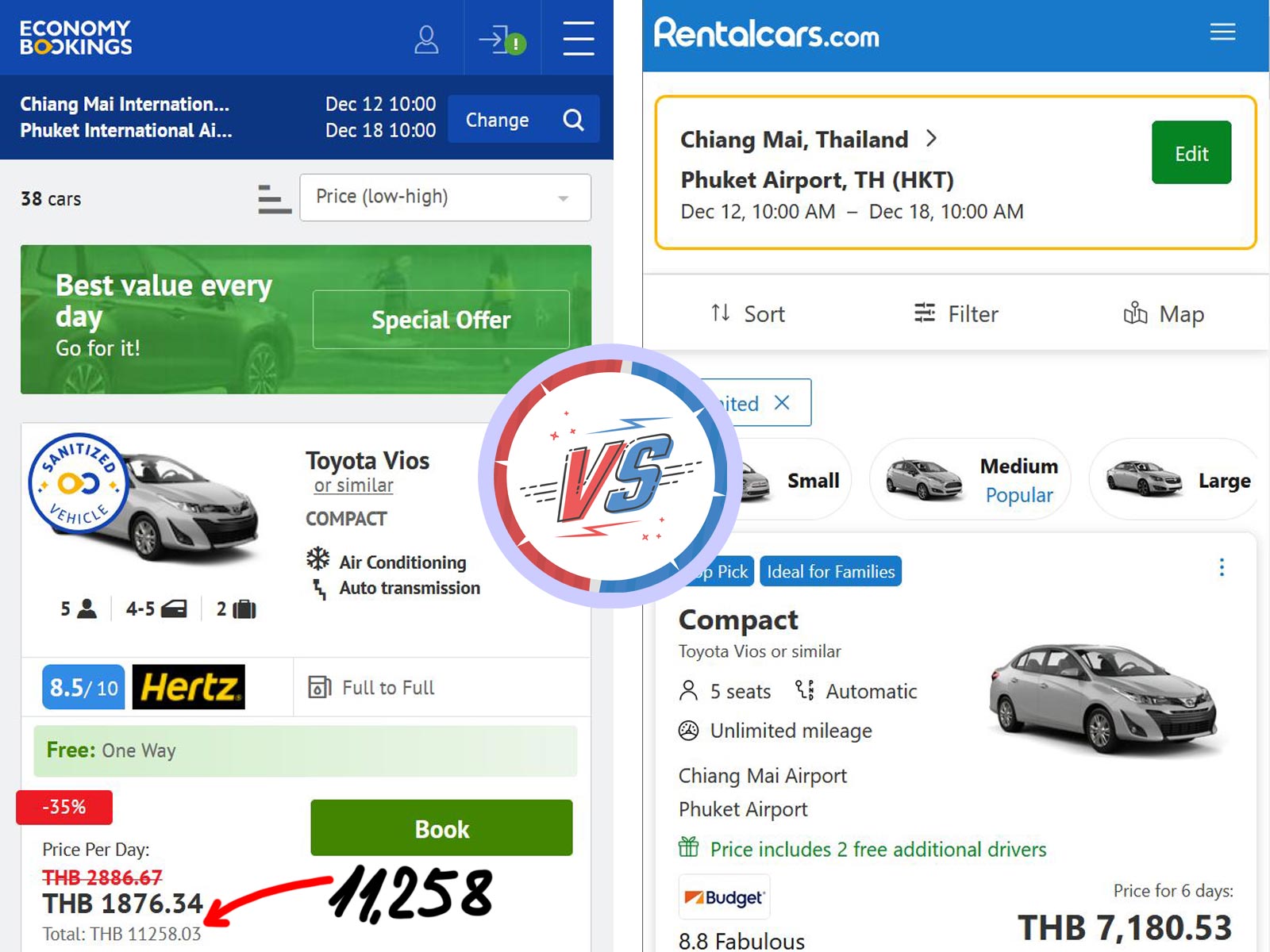
Here’s the bottom line: it really pays to compare prices before you book a car rental. But don’t wait too long! Prices change all the time, just like airline tickets. The best way to lock in a good deal is to book now. So why not check out the prices right now? It’s a friendly tip from us – don’t miss out on a great deal. Start planning your Chiang Mai adventure today, beginning with the car rental.
As you already understood, it is not profitable to rent cars directly from the rental shop. And this is another reason why we recommend Economy Bookings and Rental Cars. Because on these websites you will find the best prices that you will hardly find on the websites of service providers if you want to book a car directly.
Average cost of car rental
The typical daily rental cost for a compact car in Chiang Mai runs between 600-800 baht, while a sedan costs around 1000-1200 baht, regardless of whether it’s rented from a major company or an individual. The final price is influenced by factors such as the season, car model, and length of rental. Smaller cars and manual transmission pickup trucks are usually the least expensive options. Rental companies are also likely to offer discounts for rentals exceeding three days.
Monthly rentals tend to range from 15-25 thousand baht. This pricing is fairly standard across international franchises, local businesses, and private rentals. However, it’s advisable to compare prices for your specific dates. Smaller rental shops often offer better deals, particularly for rentals spanning 2-3 months.
Utilizing rental brokers, as mentioned earlier, can simplify the process of locating the most affordable and suitable short-term rental. It saves the hassle of contacting multiple private companies in search of the best deal.
Older cars can sometimes be found for 10-12 thousand baht a month from private rentals. If you’re considering a cheaper, older vehicle, it’s essential to verify the condition of the brakes and ensure that it has First Class, also known as All Risks or Full Class insurance.
Given the hilly terrain of Chiang Mai, frequent downhill drives of 20-30 minutes are common. Defective brakes can pose a risk on extended mountain descents. While insurance should cover any accident-related expenses, note that vehicles over 7 years old are typically ineligible for First Class insurance coverage. Thus, it is advised to avoid such cars.
Also, keep in mind the peak season! Vehicles are best reserved ahead of time for occasions like the New Year and Buddhist holidays, including Loi Krathong, as demand for rentals rises, availability decreases, and prices increase correspondingly. In some instances, the surge in prices can be up to three times the regular rates.
Driving in Chiang Mai: Tips and Laws
Driving in Chiang Mai is a unique experience that requires a good understanding of the local rules and customs. Here’s what you need to know:
Basic Road Rules in Thailand
Drive on the Left: Thailand follows the left-hand driving system, meaning you drive on the left side of the road.
Speed Limits: The maximum speed limit in cities, including Chiang Mai, is 50 km/h. On highways, it is generally 90 km/h, and on motorways, it can be up to 120 km/h. Be aware that speed limits can change, so always watch for posted signs.
Seat Belts: Seat belts must be worn at all times by the driver and all passengers.
Mobile Phones: It’s illegal to use your mobile phone while driving, unless you have a hands-free system.
Drunk Driving: Thailand has strict drunk driving laws. The legal blood alcohol concentration (BAC) limit is 0.05%. If you’re caught over the limit, you can face heavy fines or even imprisonment.
Special Driving Conditions in Chiang Mai
Traffic in Chiang Mai can be heavy, especially during peak hours (7-9 AM and 4-7 PM), and it tends to get even worse during the festivals like Songkran or Loy Krathong. Keep this in mind when planning your trips.
In terms of weather, it’s important to know that Thailand has a tropical climate with a rainy season typically from July to October. Heavy rains can lead to slippery roads and reduced visibility, so extra caution is needed when driving during this period.
Parking in Chiang Mai
Parking in the city center can be a bit of a challenge due to high congestion. That being said, there are several paid parking options available. The Tha Pae Gate area has multiple parking lots, including some at shopping centers like the Night Bazaar and the Airport Central Plaza, which provide ample parking spaces. Always make sure to park in designated areas to avoid fines.
In conclusion, understanding these rules, conditions, and parking availability can make your driving experience in Chiang Mai safer and more enjoyable. Always remember to drive responsibly and respect the local laws and customs.
Must-Visit Places in and Around Chiang Mai with Your Rental Car
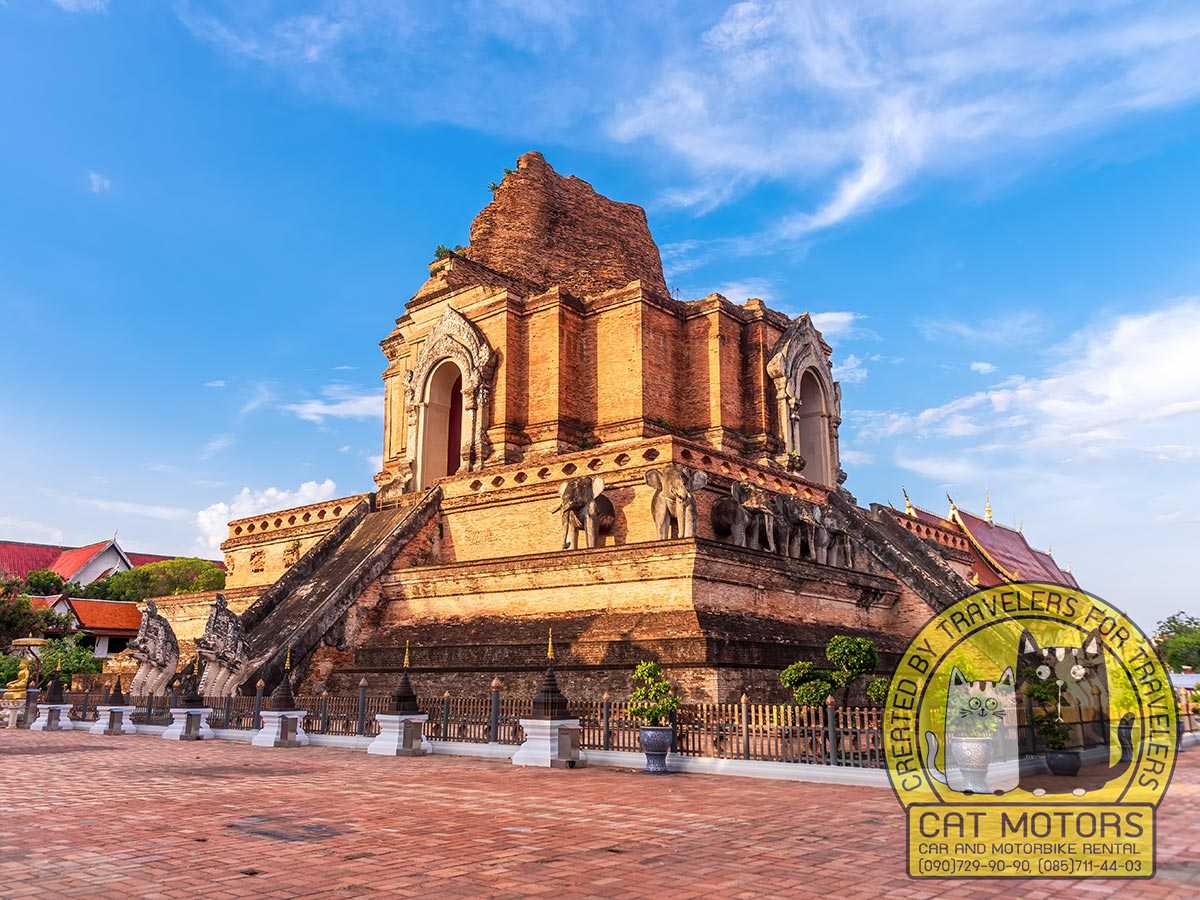
Let’s explore some of the must-visit places that you can visit with your rental car:
Old City Temples: Chiang Mai’s old city is home to over 30 temples, each one unique and rich in history. Wat Phra Singh, with its stunning Lanna-style architecture, and Wat Chedi Luang, housing a massive chedi (pagoda), are particularly noteworthy.
Doi Suthep-Pui National Park: A short 15km drive from city center will take you to this national park, home to the famous Wat Phra That Doi Suthep. From the temple, you’ll be treated to panoramic views of Chiang Mai. The park is also perfect for hiking and picnics.
Mae Sa Valley: About a 30-minute drive from the city, Mae Sa Valley is an area filled with attractions. It boasts a beautiful waterfall, elephant camps, a snake farm, an orchid farm, and a monkey school.
Mae Hong Son: If you’re up for a longer drive, embark on the Mae Hong Son loop, a 600km circuit that starts and ends in Chiang Mai. It takes you through stunning landscapes, hill tribe villages, and the charming towns of Pai and Mae Hong Son.
Chiang Dao: Nestled within the mountains about 70km from Chiang Mai, this small town is home to Thailand’s third-highest peak, Doi Chiang Dao. Explore the Chiang Dao Cave and visit the local hot springs.
Samoeng Loop: For those looking to escape the city’s hustle and bustle, take a scenic drive along the Samoeng loop. The 100km route offers views of mountains, forests, and farms.
The White Temple (Wat Rong Khun): Located in Chiang Rai, a 3-4 hour drive from Chiang Mai, this unconventional and modern temple is a piece of art and worth the trip.
Bo Sang and San Kamphaeng: About a 10km drive east from Old Town, these villages are known for their local crafts. Bo Sang specializes in making beautiful hand-painted umbrellas, while San Kamphaeng is famous for its silk and cotton weaving.
Please note that while these spots are generally accessible with a standard car, some of the more off-the-beaten-path attractions (Mae Hong Son Loop or White Temple in Chiang Rai) might require a vehicle with more rugged capabilities, such as an SUV. It’s always best to check road conditions and access information when planning your itinerary.
What to Do in Case of an Emergency or Accident
Definitely, knowing what to do in case of an emergency or an accident is very important when driving a rental car, especially in a foreign country.
Contacting the Rental Company
As soon as an accident occurs or an emergency arises, the first thing to do is contact your rental company. They will be able to guide you on the next steps to take. Before leaving the rental office, make sure you have their emergency contact number. It’s also important to familiarize yourself with their procedures for dealing with emergencies or accidents.
Insurance Claims
After an accident, the insurance process will depend on the type of coverage you opted for when renting the car. Typically, there are three types of coverage: Collision Damage Waiver (CDW), Theft Protection, and Third Party Liability.
If you opted for a CDW, you will be covered for any damages to the rental vehicle up to its full value. However, keep in mind that CDWs often come with an excess, which is the amount you’ll have to pay out of pocket before the insurance kicks in.
If the rental car is stolen and you have Theft Protection, you should be covered for the full value of the car. And if the accident involves a third party and you have Third Party Liability, you will be covered for any damages or injuries caused to others.
After an accident, document everything. This includes taking photos, writing down what happened, and gathering witness statements if possible. This documentation will help when making an insurance claim.
Local Emergency Services Information
In Thailand, the general emergency number is 191. However, for specific emergencies, there are different numbers. For medical emergencies, dial 1669. For fire, dial 199. For Tourist Police (who can communicate in English and provide assistance specifically for tourists), dial 1155.
It’s also a good idea to have the number of your home country’s embassy in Thailand. They can provide assistance in case of serious emergencies.
Remember, the best way to handle an emergency is to stay calm, ensure everyone’s safety, and follow the advice of professionals, be it your rental provider, insurance provider, or local emergency services.
By renting a car on the websites of Economy Bookings and Rental Cars, you not only get a huge selection of cars and the ability to find the best prices by comparing prices for hundreds of cars in one place, but also insurance that covers any accidents. It is important.
Returning the Rental Car
As your journey concludes, it’s essential to ensure a smooth car return process. Here’s a pro traveler’s guide to what you need to keep in mind:
Checklist before returning the car: Before handing over the keys, conduct a thorough sweep of the vehicle. Remove any personal belongings, trash, or any items that you may have added, like a GPS device or child seat. Leaving personal items in the vehicle could cause unnecessary complications.
Understanding the refueling policy: Familiarize yourself with your rental company’s fuel policy. Often, you’re expected to return the car with the same fuel level as when it was rented. If it’s not at the agreed level, you may face additional refueling charges, which can be costly. To avoid this, plan your route so it includes a stop at a gas station before returning the car.
Penalties for late returns: Time is of the essence when returning your rental car. Companies often charge for an extra day if the car is returned even an hour late. To prevent this, plan ahead and allow extra time for unexpected delays. If a delay is unavoidable, notify your rental company as soon as possible – they may offer a grace period.
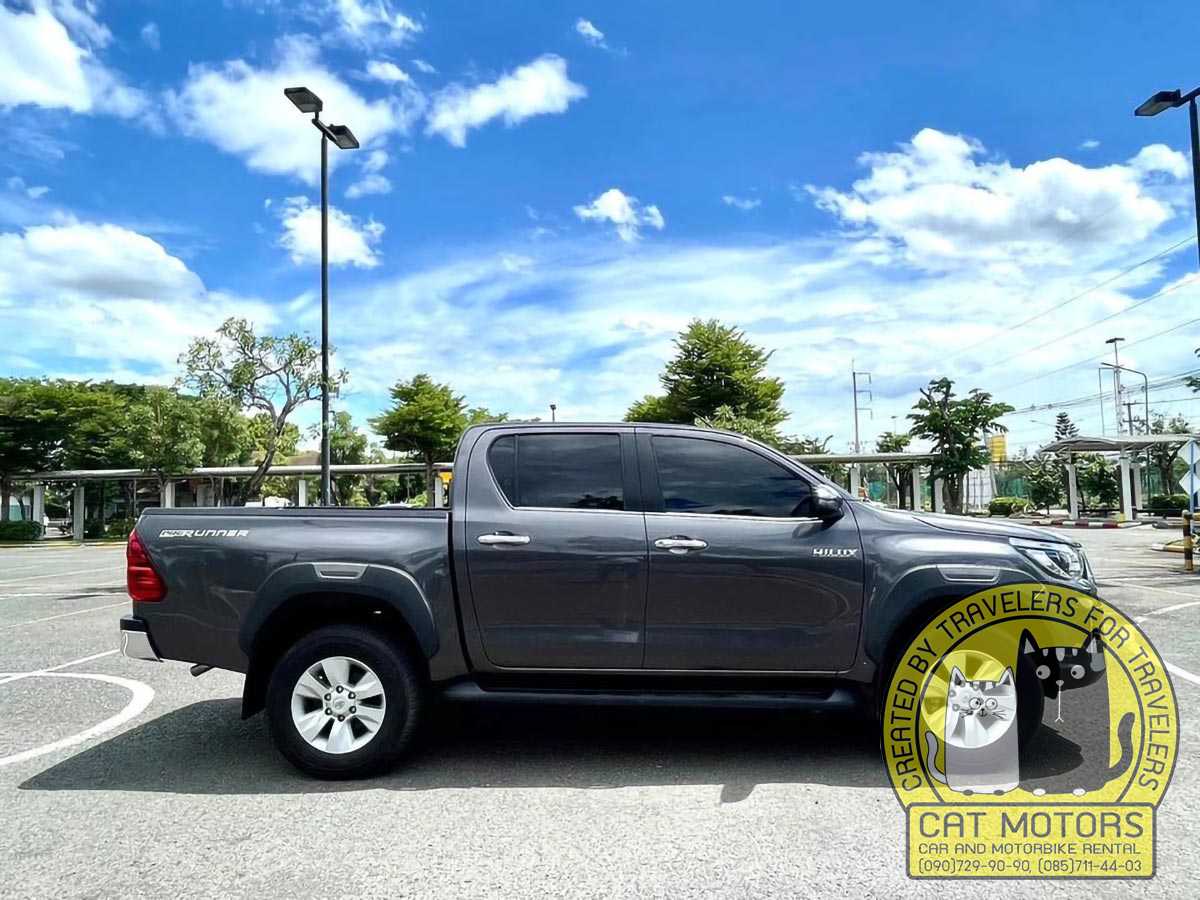
Remember, most rental agencies have a “free cancellation” policy, offering flexibility if your travel plans change. Moreover, it’s important to note the various rental locations in Thailand. Many rental providers allow for one-way rentals – you could pick up the car in Chiang Mai and drop it off in Bangkok or other cities. This option provides an excellent opportunity to explore the bustling streets of Bangkok and other Thai locales at your own pace, without the need to drive back to Chiang Mai.
Being mindful of these practices can help you avoid unnecessary hassles and fees, ensuring a pleasant end to your driving adventure.
By renting a car on the websites of Economy Bookings and Rental Cars, you can return the car not only in Chiang Mai, but also in other major cities in Thailand. This is very convenient if you are planning a busy trip to different cities and provinces of the Kingdom of Thailand.
Some Interesting Statistics
Did you know that Thailand has the highest number of motorcycle riders who unfortunately lose their lives in accidents each year, even though it’s not the country with the most motorcycles? That title goes to Indonesia, which has 5 times more motorcycles than Thailand but surprisingly, 3 times fewer accidents and deaths for every 100,000 motorcyclists. So, if you’re thinking about renting a motorcycle for a ride, you might want to consider twice. This isn’t meant to scare you; it’s just what the numbers say.
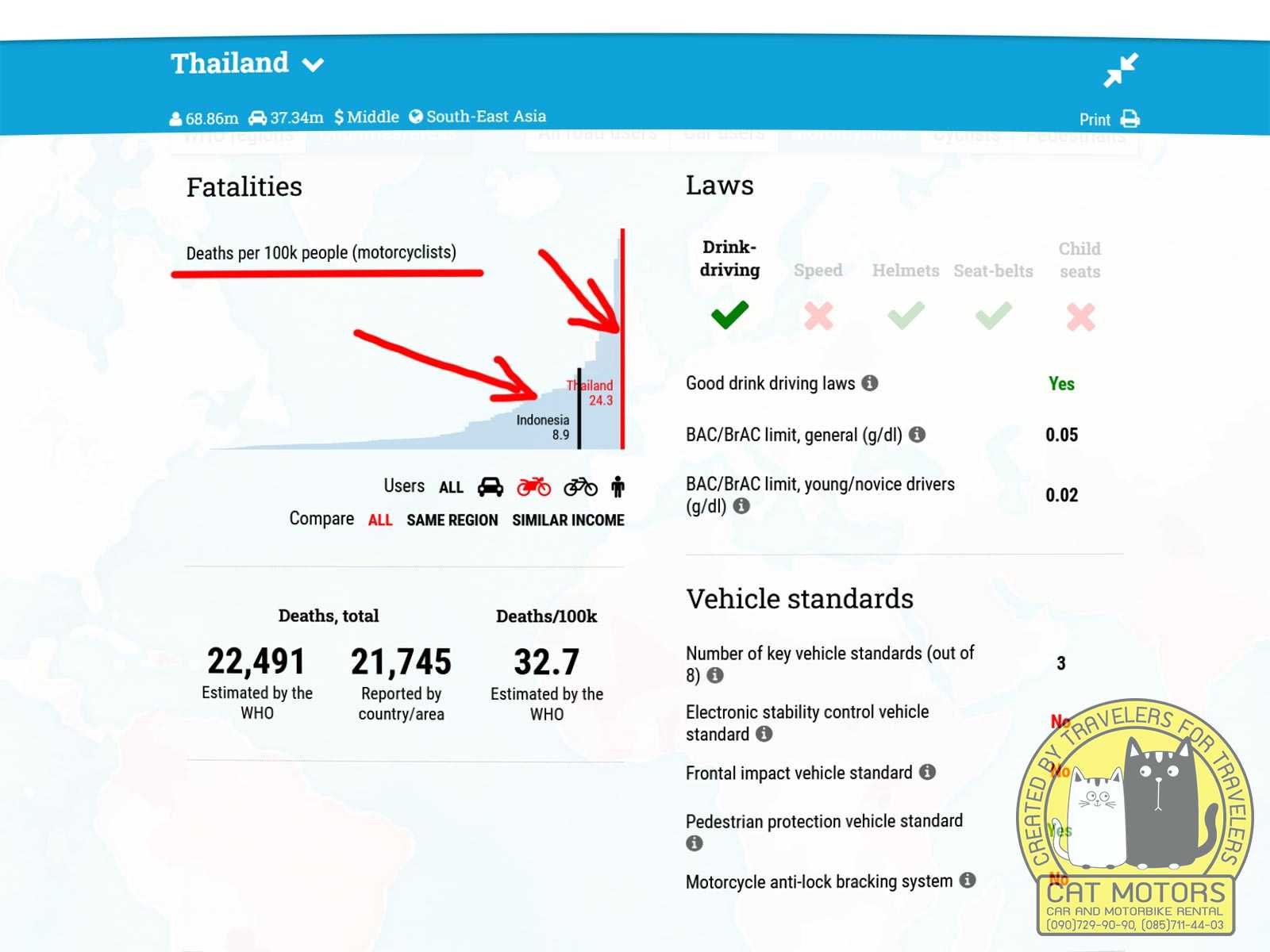
Another interesting fact – Chiang Mai, a city in Thailand, ranks high for the number of unfortunate accidents that happen there compared to all 77 provinces in Thailand.
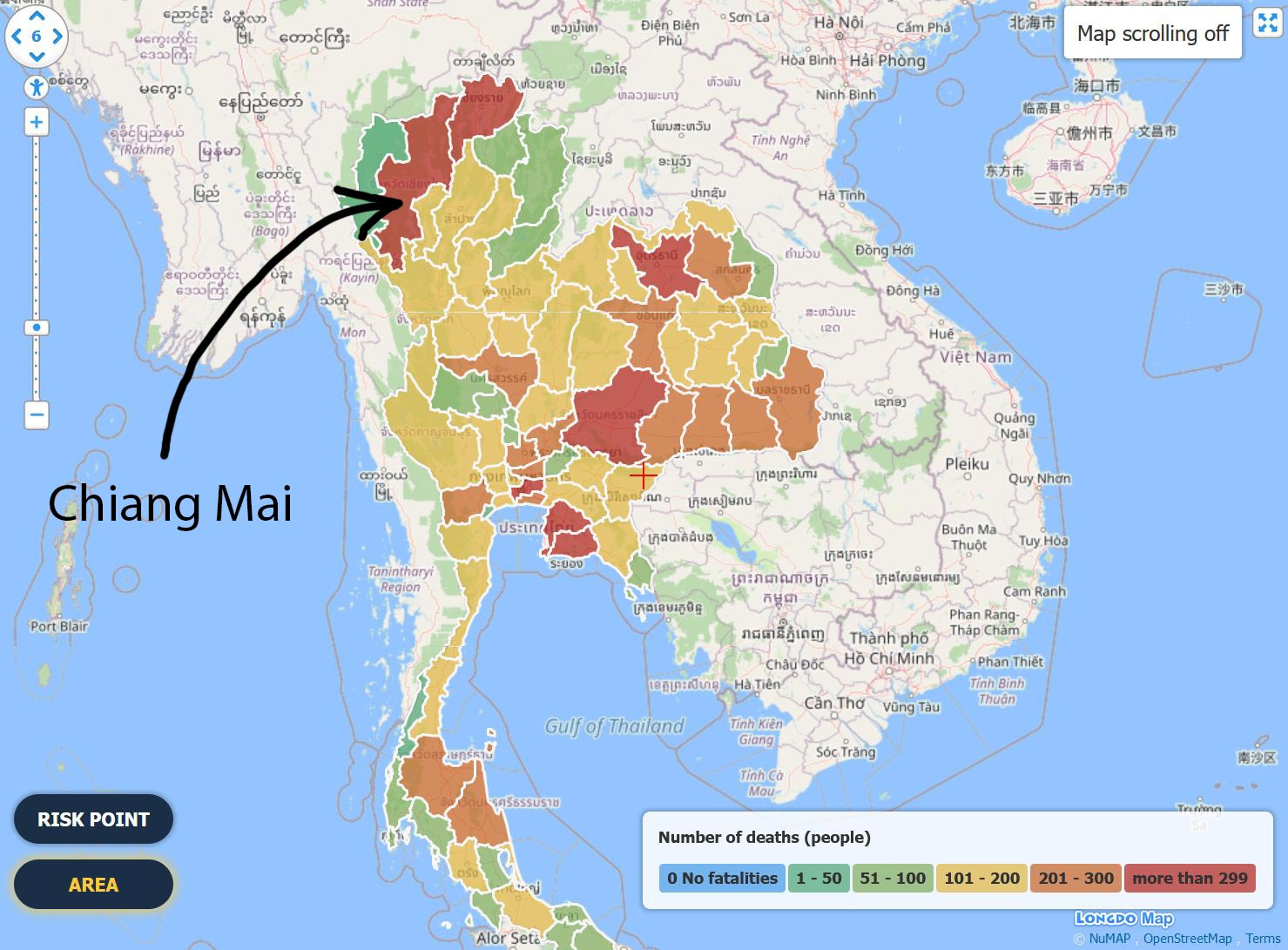
According to some information I found, Chiang Mai has a population of 1,779,254 people. From January until November 21, 2022, there were 9764 accidents with 401 people not making it out alive. This means that for every 1,000,000 people living in Chiang Mai, 223 motorcyclists were involved in deadly accidents on the city’s roads.
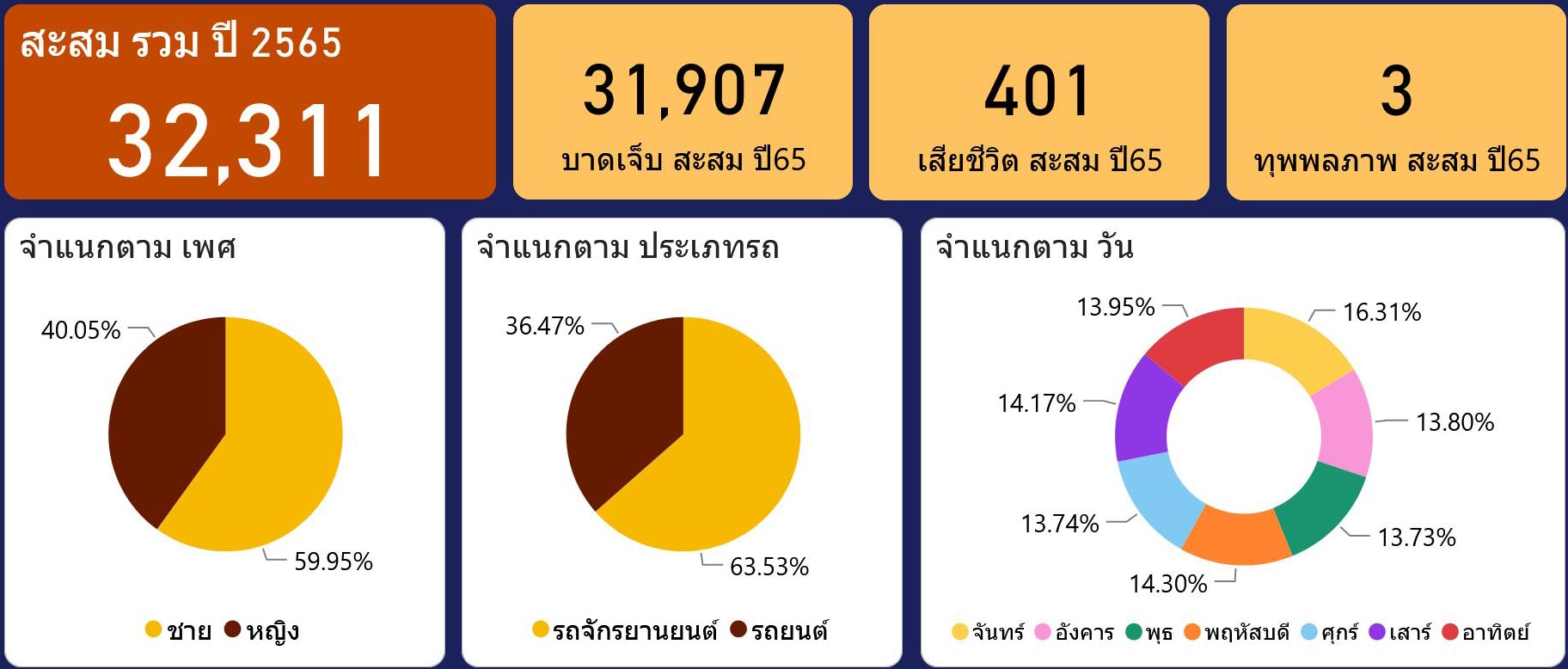
Now, let’s compare this to Bangkok Metro, which has a population of 14,626,225 but had only 827 sad accidents during the same time. So, in Bangkok, which is much bigger, only 56 people have deadly accidents for every 1,000,000 people. This means that the accident rate in Chiang Mai is 4 times that of Bangkok, where there are even more cars and traffic.
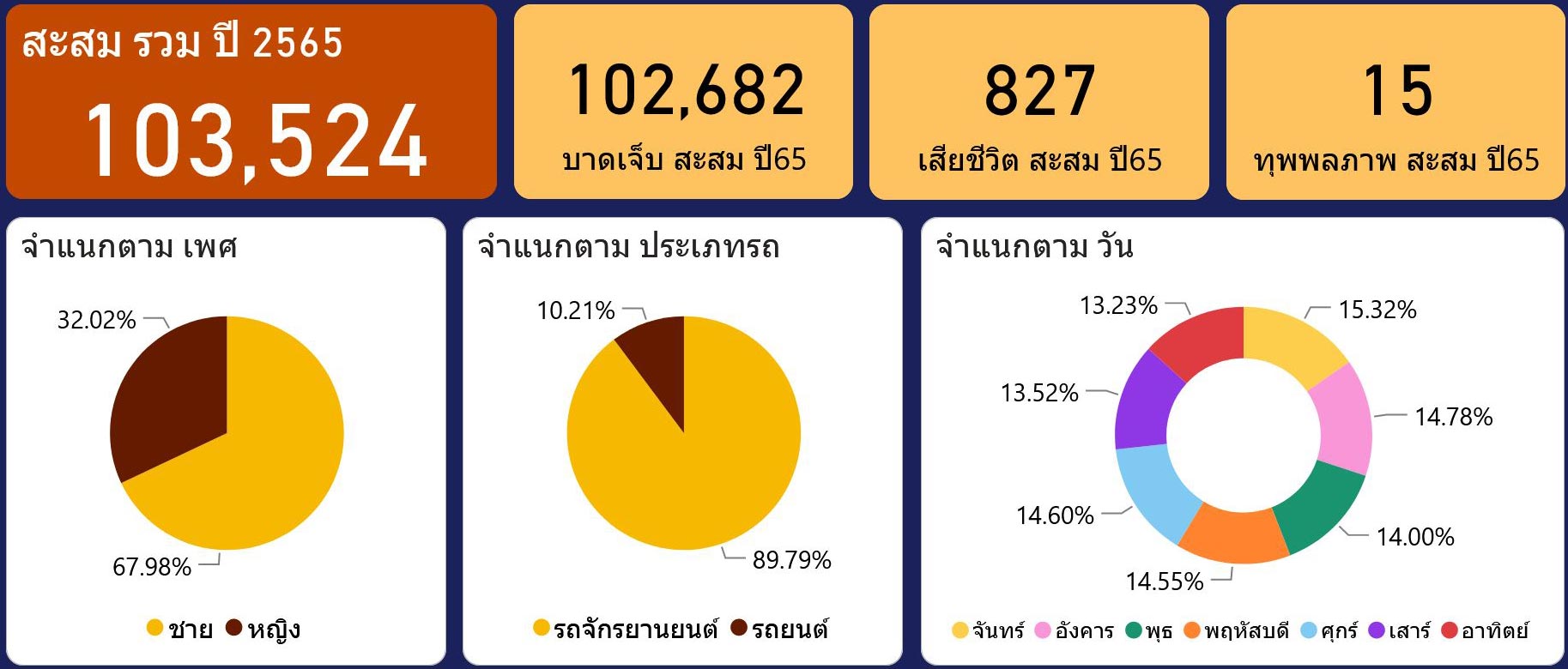
This interesting data came from the Thai RSC Accident Information Center, who get their info from insurance companies.
I think one of the main reasons for this is that the traffic police in Chiang Mai aren’t as strict as they should be. For instance, I once saw a video they posted where they were driving around the city streets, and in just 13 minutes, I noticed 9 traffic rule breaks. The most glaring one was when a car did a U-turn right under a “U-turn is prohibited for cars” sign! And what did the traffic police do? Nothing, they just carried on like it was no big deal.
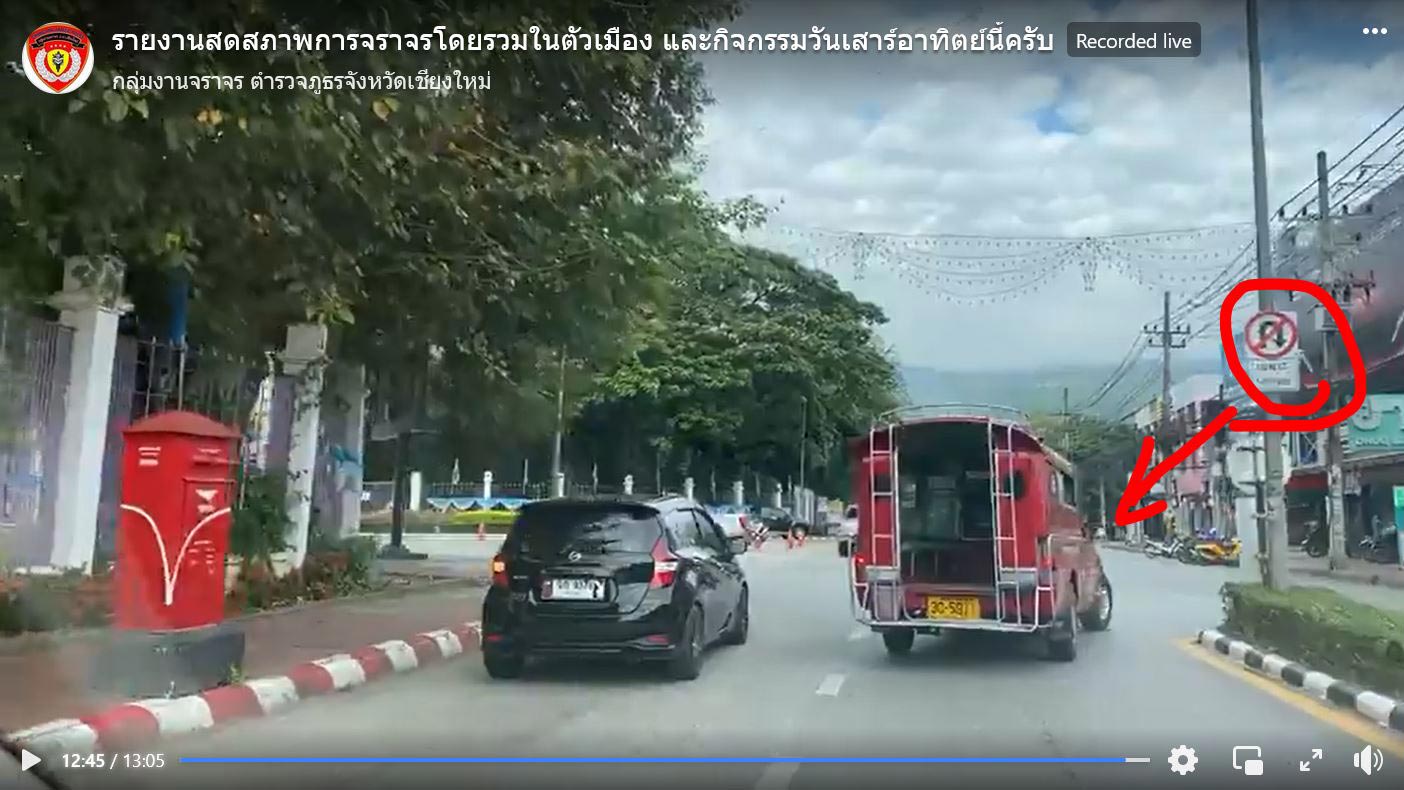
This kind of attitude from the police is why some people don’t take traffic rules seriously, which is really not cool.
So, if you’re planning to explore Chiang Mai and want to do it safely, I HIGHLY suggest renting a car instead of a motorcycle. I know, it’s a bit funny hearing that from a guy who rents out motorcycles, but trust me, it’s the safer option.
Frequently Asked Questions
It’s important to consider the reputation of the company, the types of cars they offer, their rental rates, and their rental conditions. Comparing different companies can help you find the best deal for your trip.
Sure, several car rental companies have desks in the arrival hall of the international terminal at the airport. This makes it convenient to pick up your car right after you land.
Using online booking platforms can help you find and compare car hire deals from different companies. Look out for special offers and discounts to get the best price.
Compact and economy cars are often popular due to their affordability and fuel efficiency. SUVs are also commonly rented for their ability to handle a variety of terrain, which can be useful for exploring areas around the city.
Yeap, many car rental companies have rental locations near the Chiang Mai airport, where they often provide special deals and offers. You can compare these options to get the best car rental rates.
Sure, you can. Thailand has well-maintained roads and highways connecting major cities. Remember to factor in fuel costs and travel time when planning your journey.
It depends on the rental company’s policy. Some companies offer free cancellation, while others may charge a fee. Always check the terms and conditions before making a booking.
These international brands have reputations for quality service, a variety of car models to choose from, and reliable roadside assistance. They may also offer benefits like free cancellation and competitive rental rates.
Yes, many car rental companies offer SUVs as part of their fleet. SUVs can be a great choice if you’re planning to explore more rural areas or need extra space for passengers and luggage.
Online comparison sites can help you find the best car rental deals in Chiang Mai. Booking in advance and avoiding peak tourist seasons can also help you secure a better price.
Sure, you can. However, keep in mind that traffic in Chiang Mai can be congested during peak hours. Also, be aware of the local traffic rules and regulations.
Always check for potential hidden costs, such as fuel charges, late return fees, and extra insurance costs. Ask the rental company about these before confirming your booking to avoid any surprises.
Yeap, most rental companies allow you to travel outside the city. Just make sure to inform them about your travel plans and check if any additional charges apply.
Understanding these aspects before renting a car in Chiang Mai will ensure a smoother and more enjoyable driving experience in this beautiful city.
Rental rates can vary between cities. Factors such as the type of car, rental duration, and the season can affect the cost. It’s always a good idea to compare car rental rates to ensure you’re getting the best deal.
Be mindful that in Thailand, you drive on the left side of the road. Traffic can be heavy, especially during peak hours, and watch out for motorbikes which are common on Thai roads. Also, ensure you always carry your driving license and rental documents with you.
Both have their advantages. Renting at the airport is convenient after a long flight, but rates can be higher. City locations might offer cheaper car hire but could be less convenient to reach.
Consider your needs and preferences. For instance, if you’re traveling with a large group or a lot of luggage, an SUV or a minivan may be best. For city driving and parking, a compact car could be more suitable. Checking online reviews and comparing prices can also help you make the best choice.
Booking in advance can offer several benefits, such as a wider choice of vehicles, lower prices, and the assurance of having a car ready when you arrive. Especially during peak tourist season, cars can get booked up quickly, so it’s better to reserve early.
While seeking the most affordable option might seem like a savvy move, aiming for the cheapest car rental in Chiang Mai may not always be the best choice. As a professional traveler, it’s crucial to consider factors like reliability, vehicle condition, insurance coverage, and customer service. The least expensive options might compromise on these aspects, potentially leading to issues like unexpected breakdowns, inadequate insurance, or hidden fees. It’s more prudent to seek a balance between cost and quality. Companies offering moderate prices often provide better maintained vehicles and more comprehensive services, ensuring a smoother, safer travel experience. Remember, saving a few baht isn’t worth the risk of compromising your overall travel experience in the vibrant and scenic landscapes of Chiang Mai.
Opting for a budget car rental in Chiang Mai can indeed be a reliable and cost-effective choice for travelers. Unlike seeking the absolute cheapest options, budget rentals typically offer a reasonable balance between affordability and quality. These companies often provide a range of well-maintained vehicles, sufficient insurance coverage, and acceptable customer service, catering well to the needs of most travelers. When choosing a budget rental, it’s important to read reviews, understand the terms and conditions, especially regarding insurance and mileage limits, and inspect the car thoroughly before driving off. Budget rentals can offer the freedom to explore Chiang Mai’s rich cultural landscape and beautiful surroundings without breaking the bank, making them a smart choice for travelers conscious of their spending but still prioritizing a smooth and reliable travel experience.
Hiring a car in Chiang Mai offers travelers an unparalleled opportunity to explore the region’s unique blend of cultural heritage and natural beauty at their own pace. To ensure the best experience, it’s essential to choose a reputable car hire service that offers a range of well-maintained vehicles. Look for companies with transparent pricing, comprehensive insurance options, and positive customer reviews. It’s also wise to consider the type of vehicle that suits your travel needs – a compact car might be more manageable in the city, while an SUV could be better for rural adventures. Don’t forget to check for additional amenities like GPS navigation and child seats if needed. Being clear about rental terms, especially regarding fuel policy and mileage limits, is crucial. Remember, a reliable car hire can transform your Chiang Mai journey, allowing you to discover hidden gems and enjoy the freedom and convenience of self-directed travel.
Was this post useful for you?
You can rate it by clicking on a star
Average rating / 5. Vote count:
No votes so far! Be the first to rate this post.
We are sorry that this post was not useful for you!
Let us improve this post!
Tell us how we can improve this post?
- Author: Cat Motors Team
- Posted:
- Updated: January 18, 2024
- No Comments


